
If you’re an Amazon FBA or Shopify seller weighing 1688.com against Alibaba.com in 2025, you’re really choosing between two different ways of sourcing from China.
1688 is the massive domestic B2B marketplace inside China; Alibaba is the cross‑border B2B platform built for international buyers.
The best choice depends on your priorities: lowest factory pricing and flexible MOQs, or turnkey export with clearer payments, logistics, and buyer protections.
This guide breaks down the practical differences that actually affect your landed cost, lead times, and risk—and it shows when a hybrid strategy makes sense.
1) Market focus and export readiness
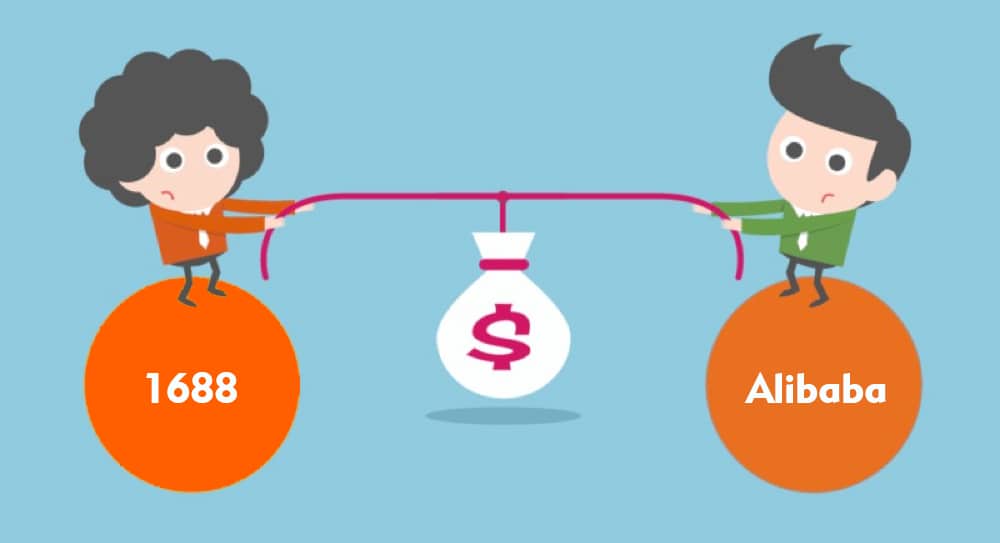
- 1688.com: Built for China’s domestic B2B wholesale market. Listings are in Chinese, prices are shown in RMB, and many suppliers are oriented around domestic orders. As a result, export licenses, documentation, and international logistics are not guaranteed—buyers often arrange EXW pickups, export declaration, and freight via a forwarder or agent.
- Alibaba.com: Built for international buyers. Suppliers are typically export‑ready, and the platform provides structured tools for cross‑border orders (specs, timelines, messaging, payments). Buyer protection and logistics options are built around international trade scenarios.
Why this matters: If you need a first shipment to move with minimal friction, Alibaba’s cross‑border orientation often shortens the learning curve. If you’re optimizing unit economics after you’ve validated a SKU, 1688 can unlock domestic‑market pricing—provided you solve payments, QC, and export logistics.
For compliance context on sensitive items and documentation when exporting from or to China, see the U.S. International Trade Administration’s 2025 guide to China—U.S. export controls (export licensing and restricted technologies). Reference: China – U.S. export controls (Trade.gov, 2025).
2) Pricing and MOQs: where the “cheaper” reputation comes from
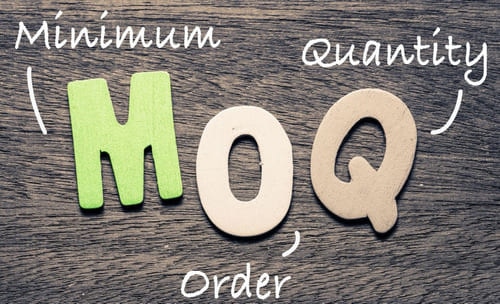
- 1688 pricing: Because it’s a domestic marketplace, many listings reflect RMB price points aimed at Chinese buyers (including distributors and factories). You’ll often see lower sticker prices and the ability to negotiate lower MOQs for trial runs—especially on commodity items or when you accept standard specs.
- Alibaba pricing: Quotations frequently bake in the cost of export handling (documentation, compliance effort), language support, and international customer service. MOQs can be higher, particularly for private‑label customization or when the supplier is set up for larger export runs.
Reality check: Neither platform is inherently cheaper for every situation. For private‑label customizations, both 1688 and Alibaba suppliers may converge near similar “true” costs once you include molds, compliance testing, and quality assurance. The right play is to compare apples to apples on Incoterms (EXW vs FOB vs DDP), packaging specs, and QC scope.
3) Payments and buyer protection
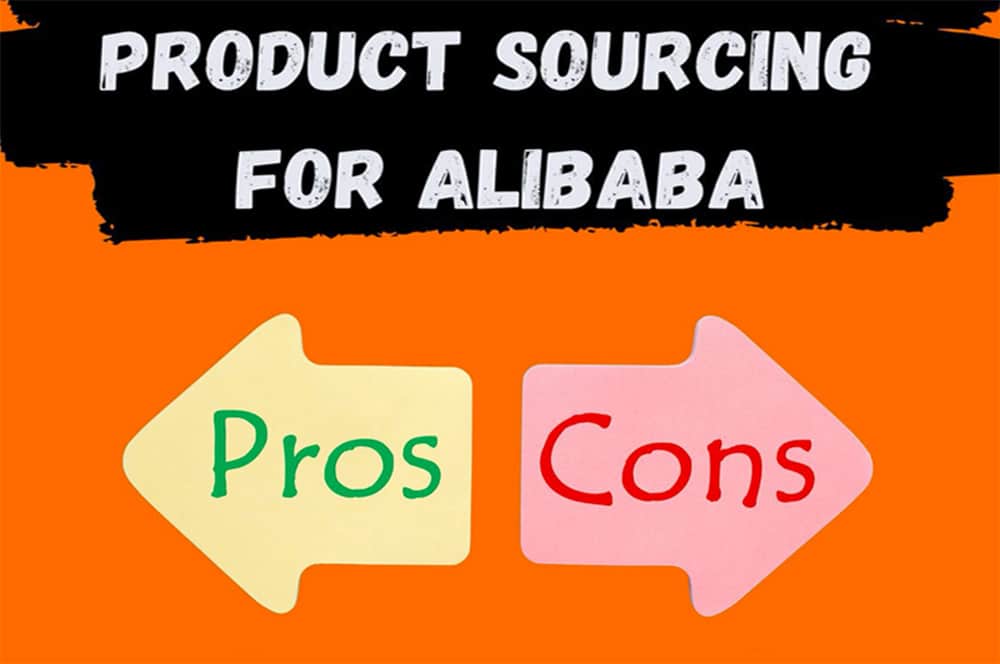
- Paying on 1688 (as an overseas buyer): 1688 primarily uses domestic rails (Alipay, WeChat Pay, local bank). In 2025, the officially supported path for many overseas businesses is WorldFirst’s 1688 World Pay (also called Kuajingbao/KJB), which lets you fund a WorldFirst account (often in CNH) and pay suppliers on 1688 directly without a Chinese bank account. See WorldFirst’s official product page: WorldFirst 1688 World Pay (2025).
- Paying on Alibaba: Alibaba supports multiple payment methods for international buyers—including credit/debit cards, PayPal, Apple Pay/Google Pay, and wire—often with transaction caps and typical card processing fees around the low‑3% range. Details are summarized in Alibaba Reads’ 2024 payments guide.
- Buyer protection on Alibaba: Trade Assurance covers late shipment and quality nonconformity when you place and pay through the platform. Alibaba Reads notes in 2024 that Enterprise/Enterprise Pro accounts have a 60‑day eligibility period post‑delivery for claims, while standard buyers typically have a shorter window around 30 days; always check current terms in your account. Source: Alibaba’s 2024 Trade Assurance overview.
- Alibaba Guaranteed (2024): For eligible SKUs, Alibaba introduced a fixed‑price purchasing experience that includes shipping, promises dispatch within a short window, and streamlines after‑sales support. It’s designed to reduce friction for SMEs that want an “online shopping‑like” sourcing experience. See Introducing Alibaba Guaranteed (Alibaba Reads, 2024).
- Buyer protection on 1688: Protection mechanisms exist for domestic transactions, but official English documentation of cross‑border dispute rules is limited. If you source via 1688 from overseas, it’s prudent to use secure payment rails (e.g., KJB) and implement extra safeguards (detailed specs, staged QC, and documented evidence).
Practical tip: Regardless of platform, keep all agreements specific (materials, tolerances, labeling, packaging, inspection criteria, shipment dates, and Incoterms), and avoid moving payments off‑platform if you want platform‑level protections to apply.
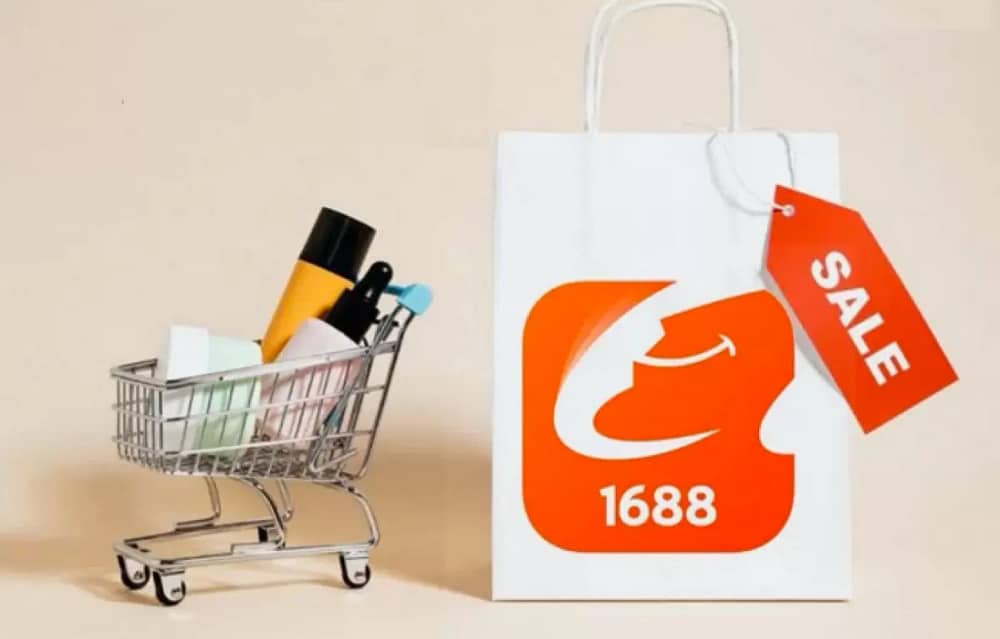
4) Language and communication support
- 1688: Chinese‑first interface and messaging; many suppliers primarily serve local customers. Machine translation can help, but nuanced negotiation and QC/engineering conversations benefit from bilingual support.
- Alibaba: Multilingual interface and support for international buyers, with structured order and messaging tools that make it easier to formalize specs and milestones.
Implication: If you’re new to China sourcing or need complex customizations, Alibaba’s language tooling and order structure can reduce misunderstandings. If you operate on 1688, consider bilingual assistance for negotiations, sampling, and factory coordination.
5) Logistics and FBA pathways
- 1688 flows (typical): Supplier ships domestically to a China address (your consolidator/agent), then you—or your agent—organize export clearance, international freight, destination customs, and final delivery (e.g., Amazon FBA or your 3PL). This is commonly EXW or FCA from the supplier’s facility.
- Alibaba flows (typical): Many suppliers can quote FOB/CIF/DDP and coordinate with forwarders experienced in cross‑border e‑commerce. Alibaba has offered guides and tools to compare shipping options and track shipments under its logistics umbrella, making it simpler to get from PO to door. For platform context, see Alibaba Reads’ 2025 logistics guide.
Checklist for either route:
- Confirm Incoterms (EXW/FOB/CIF/DDP) and what’s included.
- Align on FBA/3PL labeling, carton/pallet specs, and booking procedures.
- Decide on QC checkpoints (pre‑production samples, During Production Inspection, Pre‑Shipment Inspection) and who signs off.
6) Which should you choose in 2025?
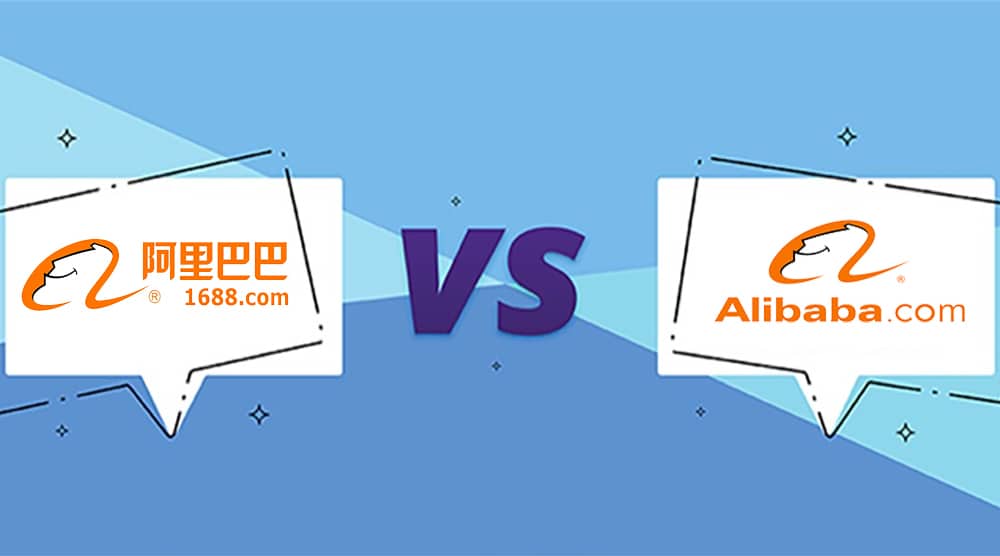
Choose Alibaba if you:
- Want turnkey export readiness, clearer buyer protection, and multi‑currency payment convenience.
- Prefer to formalize specs, timelines, and QC through a platform built for cross‑border orders.
- Need faster time‑to‑first‑shipment with less coordination overhead.
Choose 1688 (ideally with an agent) if you:
- Are optimizing unit costs and need flexible MOQs for testing multiple SKUs.
- Can handle (or outsource) bilingual negotiation, sampling, QC, and export logistics.
- Are prepared to set up WorldFirst KJB or an equivalent payment solution for compliance and traceability.
Consider a hybrid:
- Use 1688 for pilot batches and cost discovery, then migrate stable SKUs to Alibaba for repeat orders with Trade Assurance and integrated logistics—or keep a split strategy depending on SKU risk and required service levels.
7) How a sourcing agent bridges 1688 and Alibaba (risk‑first workflow)
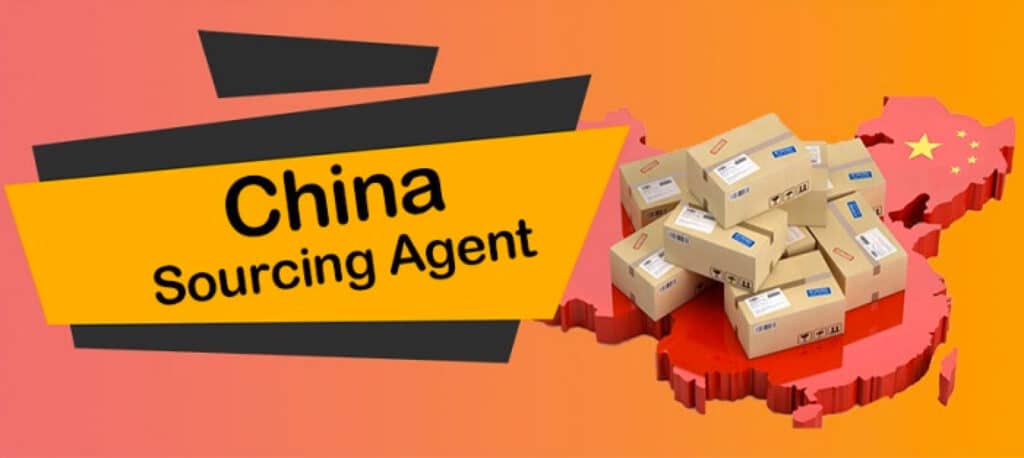
A capable agent can compress risk and lead time by integrating these steps into one managed flow:
- Supplier discovery and vetting
- Verify business licenses, production scope, and export history (when applicable).
- Screen for middlemen, check factory capacity, and evaluate responsiveness.
- Bilingual negotiation and spec lock‑in
- Translate your drawings/specs, surface tolerances and materials, and confirm packaging/labeling details.
- Align on inspection criteria and shipment date in writing.
- Sampling and quality control
- Order pre‑production samples; run engineering changes if needed.
- Schedule DPI/PSI inspections with evidence (photos, videos, reports) before final payment.
- Payments and documentation
- On 1688, set up WorldFirst KJB or use agent‑managed payments to ensure funds flow is documented and compliant (refer to WorldFirst’s 2025 product page noted above).
- On Alibaba, keep payments and messaging within Trade Assurance to preserve coverage (see the 2024 Trade Assurance overview cited earlier).
- Export logistics and compliance
- Confirm HS codes and any product‑specific certifications required for your destination.
- For sensitive items and evolving regulations affecting China‑related shipments, cross‑check official guidance such as Trade.gov’s 2025 export controls page cited above.
- Book the forwarder (air/ocean/express), finalize FBA/3PL prep, and manage delivery appointments.
Signal you’re serious: Provide a concise RFQ package (specs, target Incoterms, desired lead time, QC checkpoints) so suppliers can quote accurately on either platform.
8) Quick comparison table
| Dimension | 1688.com | Alibaba.com |
|---|---|---|
| Market focus | China domestic B2B | Global cross‑border B2B |
| Pricing & MOQs | Often lower RMB prices and flexible MOQs; negotiate in Chinese | Prices often include export service layers; MOQs can be higher for export runs |
| Payments | Domestic rails; overseas buyers commonly use WorldFirst KJB or agent | Cards/PayPal/wire with platform escrow; Trade Assurance |
| Buyer protection | Domestic‑oriented; limited English dispute info | Trade Assurance; Alibaba Guaranteed for eligible SKUs |
| Language | Chinese‑first UI and messages | Multilingual, English‑first tools |
| Logistics | Domestic shipping by default; you arrange export | Many suppliers export‑ready; logistics tools/guides available |
9) FAQs
1. Is 1688 always cheaper than Alibaba?
Not always. 1688 often lists lower domestic RMB prices, but once you add sampling, QC, export documentation, freight, and compliance testing, the true landed cost can converge. Compare quotes on the same Incoterms and spec.
2. Can foreigners pay on 1688 without a Chinese bank account?
For many overseas businesses, yes—via WorldFirst’s 1688 World Pay (KJB), which lets you fund in supported currencies (often converting to CNH) and pay suppliers directly on 1688. Set‑up steps and eligibility vary by region; see the official WorldFirst product page cited above.
3. What does Alibaba’s Trade Assurance actually cover?
Late shipment and quality nonconformity when the order is placed and paid through the platform with covered suppliers. Time windows differ by account tier; Alibaba’s 2024 overview notes Enterprise tiers have 60‑day claim windows post‑delivery, while standard buyers typically have shorter periods.
4. Should I combine both platforms?
Many sellers do. Use 1688 for small pilots and cost mapping; use Alibaba for repeat orders where you value protections, multi‑currency payments, and easier logistics—or maintain both depending on SKU maturity and risk profile.
Also consider: a managed bridge between 1688 and Alibaba
If you prefer to outsource supplier vetting, bilingual negotiations, inspections, payments setup, and export logistics across both platforms, you can work with a sourcing agent.
One example is Yansourcing, a China‑based team that supports end‑to‑end sourcing, quality control, private labeling, and FBA‑ready logistics.
If you’d like help evaluating SKUs across 1688 and Alibaba, request a free sourcing quote from Yansourcing—share your target specs, MOQ, and destination to get a realistic plan and timeline.
